In This Story
Language, observes Honors College Student Phillip Dickey, has the “ability […] to heal and provide unity amongst people with different backgrounds and viewpoints in life.” It also has the ability to shape who feels included and excluded. Studying these concepts in HNRS 130: The Politics of Language enables students to observe and apply them within the world around them. Students at Mason and residents of Northern Virginia come from all over the world, bringing their languages, dialects, and accents with them. Mason prides itself in bringing together multicultural perspectives and fostering inclusivity, and the Honors College committed to promoting these values through its course offerings.

Anna Habib, an Honors College alumna who is now Term Professor of English and the Associate Director of Composition for Multilingual Writers, teaches this course as a way of giving back to the Honors College. “I picked the politics of language because a lot of the work that I've been doing is around linguistic justice,” Habib explains. Habib is engaged with the intersection of language and inclusion. Much of her research and professional work around linguistic justice focuses on finding ways to train faculty to be more aware of and respectful toward non-standard varieties of English. Habib noticed that students are too often missing from this conversation: “I was really curious to see what do students think and how do they take up these issues? So that's sort of where [the idea for this class] started. I wanted to help students think critically about the interplay of language and power. I wanted them to be able to recognize the ways that language is wielded to maintain power structures, but also how it can be used to reveal and even challenge those structures.”
HNRS 130: The Politics of Language is an Honors College course that looks deeper into the relationship between language and power structures in current society. Through an intimate seminar-style structure, students discuss readings covering the language of power/power of language, the language of politics/politics of language, linguistic discrimination, the language of war, cancel culture, inclusive and antiracist language, linguistic erasure, and linguistic revitalization. “My favorite topic in class is inclusive and diverse language because I think it’s such a relevant topic, especially since it’s something that Mason is trying to incorporate on our campus,” says Honors College student Brooke Gormon. “It’s always cool to learn about things that are relevant—especially relevant to Mason.”
As a way to encourage students to actively take charge of their learning, students facilitate discussions about each class session’s main topic. “We spend most of the class with the students leading,” says Habib. To help those who learn best through individual writing and reflection, students also write multiple reading responses and reflection pieces about what they read and discuss in class. Students have a range of choices for completing their final projects. These include writing a linguistic justice statement, filming a video essay, or making a creative public display to raise awareness of some of the themes from the class. Habib explains, “I structure the project in a way that they can pick what makes them more passionate about the topic because otherwise, what's the point?”
As to the overall goal of this class, Habib says, “I hope that [my students] will be more aware of any implicit bias that they [and others] have in relation to linguistic identity and linguistic practices and that they will be able to discern truth in a world that is oversaturated with information and misinformation. If they understand that language can be a tool for power, both good and bad, then they enter the world as more engaged, aware and compassionate citizens.” This neatly aligns with the Honors College’s overall goal to broaden students’ understanding of the world and challenge their beliefs through the Honors College’s unique curriculum. Mac Clapper, a graduating senior, underscores this point: “I would […] recommend HNRS 130 [The Politics of Language] with Professor Habib to other students. I think this has been my favorite Honors College class I’ve ever taken. It just really synthesizes everything that the Honors College stands for.”
